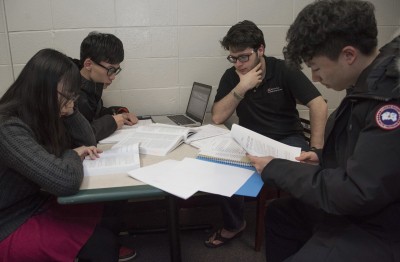
Boston University’s College of Communication will expand its Communications Immersion Program this year to help accepted international students in the COM graduate program adjust to American classrooms, said David Cotter, the assistant dean of graduate affairs.
The free program, founded in 2014 as part of BU’s Digital Learning Initiative, was initially designed to provide Chinese students a six-week online academic workshop and connect them with American students prior to arrival, Cotter said. With increased funding from the university, CIP can now benefit all qualified international students, Cotter said.
“We feel comfortable enough having worked with one population to test-run the program before opening it to the whole international population,” Cotter said. “Through feedback and survey, Chinese-speaking students told us they wanted to come to America and experience graduate school not as [a] Chinese, but as a BU student.”
Out of 8,452 international students enrolled in the fall 2015 semester, COM houses 7 percent with 566 students, according to data provided on the International Students and Scholars Office website.
The website also showed a significant increase in the number of international students enrolled at BU over the past 10 years, particularly Chinese. There were 1,109 Chinese students enrolled at BU in the year 2010, which hiked up to 3,637 students in 2015, the website stated.
The overall goal for the program is to help accustom international students with life at BU, in Boston and in American classrooms, Cotter said.
“Putting yourself in the shoes of an international student, if you were flying halfway across the world, whether to Argentina, China or to wherever, it is sort of crass to expect you to know exactly what to do and how to do it as soon as you are off the plane,” Cotter said. “COM’s graduate student population is growing, so too is COM’s international graduate population. We as a college did not do [anything] in years past to help students ‘land.’”
The COM graduate program has 152 international students enrolled in the fall 2015 semester out of a total of 354 graduate students, according to data in the COM Graduate Affairs StudentLink. In the spring 2016 semester, there are 123 international graduate students out of 275, the data showed.
Nazli Kibria, chair of the Department of Sociology, said CIP is a helpful resource for international students with questions regarding life in America.
“It would be particularly useful for international students to get a chance to chat with American students who are already here,” Kibria said. “International students can get a sense of what things are like and ask really ordinary questions such as, ‘Are there washers and dryers in the dorms?’”
Kibria said she hopes to see the program extend to help current international students support incoming students as well.
“[International students] should also have a chance to support each other and exchange ideas amongst themselves online,” Kibria said.
Students said the expanded program would be beneficial for any student who is unfamiliar with the culture and classrooms condition in the United States.
Qiuyue Wang, a freshman in the College of Arts and Sciences, said the program is a positive resource for international students like her, as living in a different culture can be difficult.
“There are so many students like me who are not very familiar with the language of English,” Wang said. “This program is really helpful.”
Anam Amirali, a sophomore in CAS, said she thinks the expansion of the program is a positive measure, especially to international students she knows.
“This past year, one of my roommates was an exchange student from Japan, and I know she struggled because there weren’t a lot of resources available to her,” Amirali said. “It’s a great idea [for] anyone whose primary language isn’t English [to] have more resources in the community.”
Hellen Giang, a junior in the Sargent College of Health and Rehabilitation Sciences, said the program is a great resource for transitioning international students to the BU campus.
“[An international student’s life] is already hard enough with cultural gaps, language gaps and everything else,” Giang said. “Pairing with American students is a great idea because then they have someone for outreach. It is good to have that person no matter what.”
Alex Li contributed to the reporting of this article.
























































































































Silas • Jan 28, 2016 at 11:58 am
Dear Caroline,
Can I call you Caro? It just feels right. I so connected with your writing voice (it feels like I knew you in a different life) and I wanted to thank you for putting out such great work so quickly. I’m an equally overwhelmed student and I applaud you for devoting yourself to the FREEP on top of all your other work.
I look forward to reading more of your work.
Best,
Silas